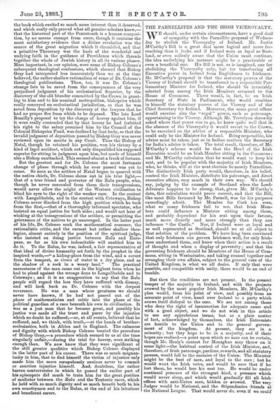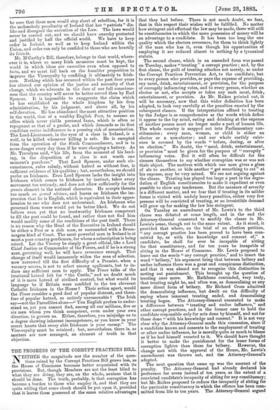THE PARNELLITES AND THE IRISH VICEROYALTY.
WE should, under certain circumstances, have a good deal of sympathy with the Parnellite proposal of Wednes- day to abolish the Viceroyalty of Ireland. Mr. Justin Waithy's Bill is a great deal more logical and more far- reaching than it looks, and if Ireland were as loyal as Scot- land, or even sullenly aware that the Union must continue, the idea underlying his measure might be a practicable or even a beneficial one. His Bill is not, as is imagined, one for abolishing the Viceroyalty only, but for transferring all Executive power in Ireland from Englishmen to Irishmen. Mr. Worthy's proposal is that the statutory powers of the Viceroy of Ireland should be transferred to a responsible Par- liamentary Minister for Ireland, who should be invariably selected from among the Irish Members returned to the House of Commons. There would, in fact, be an Irish Secretary of State in Parliament, who would combine in himself the statutory powers of the Viceroy and of the Chief Secretary for Ireland. Moreover, the same great officer would exercise also the "regal" power, such as patronage, appertaining to the Viceroy. Although Mr. Trevelyan shrewdly asked where that power was to go, he knew quite well that in the absence of the Viceroyalty it would revert to the Crown, to be exercised on the advice of a responsible Minister, who could only be the Minister for Ireland. Being responsible, his advice must be taken, just as in Indian matters the Secretary for India's advice is taken. The total result, therefore, of Mr. Worthy's scheme would be that the Head of the Irish Executive would be an Irish Member sitting in the Commons ; and Mr. M'Carthy calculates that he would want to keep his seat, and to be popular with the majority of Irish Members, who, he thinks, will at the next election be mostly Parnellites. The distinctively Irish party would, therefore, in his belief, control the Irish Minister, distribute his patronage, and direct executive affairs, very much in their own way, We should say, judging by the example of Scotland when the Lord- Advocate happens to be strong, that, given Mr. Worthy's data, this calculation would prove correct, and that the Bill, like most Bills favoured by Mr. Parnell, was for his purposes exceedingly adroit. The Member for Cork has seen, what so many Irishmen fail to see, that Irish Mem- bers could influence a Minister sitting among them, and probably dependent for his seat upon their favour, much more directly and more strongly than they can influence " the Castle." Nor, if Ireland were as loyal and as well represented as Scotland, should we at all object to that solution of the problem. We have long been convinced that only Irishmen can govern Irishmen well, for only Irish- men understand them, and know when their action is a result of thought and when a display of perversity ; and that the governing Irishmen should be Members of the House of Com- mons, sitting in Westminster, and taking counsel together and arranging their own affairs, subject to the general vote of the United Kingdom, is what we all desire. If only that were possible, and compatible with unity, there would be an end of trouble.
But then the conditions are not present. In the present temper of the majority in Ireland, and with the projects avowed by the most popular Irish Members, Mr. Worthy's plan would, from his point of view, and possibly from an accurate point of view, hand over Ireland to a party which avows itself disloyal to the core. We are not among those who deny the right of insurrection for adequate cause and with a good object, and we do not wish in this article to use any opprobrious terms, but as a plain matter of fact, acknowledged by themselves, the Irish Extremists are hostile to the Union and to the general govern- ment of the kingdom. At present, they are in a minority ; but they hope to be in a majority, and if their hopes are realised—a point upon which no man can be certain, though Mr. Healy's contest for Monaghan may throw on it some light—the habitual control of the Irish Minister, and, therefore, of Irish patronage, pardons, rewards, and all statutory powers, would fall to the enemies of the Union. The Minister might be the best of men, and loyal to the core ; but he would want the Irish votes, and would be sure that if he lost them, he would lose his seat too. He would be under continual pressure of the strongest kind, a pressure which would never sleep, and which would gradually fill u11 'Ash-- offices with anti-Union men, hidden or avowed. The very- Judges would be National, and the Stipendiaries friends of the National League. That would never do, even if we could
be sure that these men would stop short of rebellion, for it is the melancholy peculiarity of Ireland that her " patriots " dis- like and disregard the execution of the Law. The laws would never be carried out, and we should have anarchy protected and justified by half the official world. We have to keep order in Ireland, as well as to keep Ireland within the Union, and order can only be confided to those who are heartily its friends.
Mr. M'Carthy's Bill, therefore, belongs to that world, where- ever it is, where so many Irish measures must be kept, the world in which ideas are executive even when opposed to facts, and we must fall back on the humbler proposition to improve the Viceroyalty by confiding it ultimately to Irish- men. Nothing which has occurred within the past four years has altered our opinion of the justice and necessity of that change, which we advocate in the face of our full conscious- ness that the country will never be better served than by Earl Spencer. It is impossible to exaggerate the claim which he has established on the whole kingdom by his firm administration, by his judgment, and above all, by his self-devotion. He has abandoned the most attractive position in the world, that of a wealthy English Peer, to assume an office which never yields personal fame, which is often as repugnant as that of a gaoler, and which demands as its first condition entire indifference to a pressing risk of assassination. The Lord-Lieutenant, in the eyes of a class in Ireland, is a wolf, to be killed whenever killing is safe. He is excepted from the operation of the Sixth Commandment, and is in more danger every day than if he were charging a battery. As Mr. Trevelyan said, " his life, from the moment of his land- ing, in the disposition of a class is not worth one moment's purchase." That Lord Spencer, under such cir- cumstances, rules calmly, without hatred as without fear, is sufficient evidence of his qualities ; but, nevertheless, we should prefer an Irishman. Even Lord Spencer lacks the insight into Irishmen which comes to Irishmen by instinct, takes every movement too seriously, and does not allow sufficiently for the gamin element in the national character. He accepts threats too much an grand se'rieux, and leaves on Irishmen the im- pression that he is English, which is equivalent in their appre- hension to one who does not understand. An Irishman who governed them worse would yet be better liked. We do not believe even yet that no trustworthy Irishman competent to fill the post could be found, and rather than not find him would modify some of the conditions of the post itself. There is no reason why the Head of the Executive in Ireland should be either a Peer or a rich man, or surrounded with a Brum- magem kind of Court. The most powerful man in Ireland is at most a poor country gentleman, for whom a subscription is being raised. Let the Viceroy be simply a great official, like a Lord Chief Justice or Commander of the Forces, and if he is a strong man, governing well, he will have reverence enough. That .change of itself would immensely widen the area of selection, now narrowed till the first difficulty of a Premier, when a vacancy occurs, is not to select among applicants, but to in- duce any sufficient man to apply. The Times talks of the irrational hatred felt for " the Castle," and no doubt much of it is mere hatred of civilised control, but what would its language be if Britain were confided to the ten cleverest Catholic Irishmen in the House Their action apart, would the Times consider a good deal of popular distrust, and there- fore of popular hatred, so entirely unreasonable / The Irish say—not the Parnellites alone—" You English profess to under- stand us, yet you cannot find, among all our millions, five or six men whom you think competent, even under your own direction, to govern us. Either, therefore, you misjudge us to a degree showing inherent incompetence, or you know in your secret hearts that every able Irishman is your enemy." The Vice-royalty must be retained ; but, nevertheless, there is, as matters are now arranged, an element of truth in that objection.



































 Previous page
Previous page